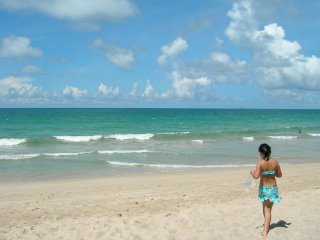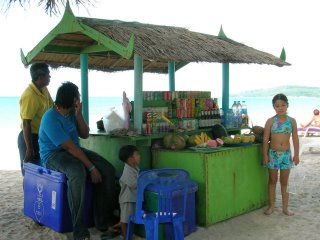Phuket Thailand: The Ethics and Risks of Travel
After spending an inordinate amount of time in Asia’s largest cities (Tokyo, Seoul, Shanghai, Beijing, Hong Kong and Bangkok) we really wanted to get somewhere uncrowded with stretches of white sandy beach, swaying palm trees, and blissful quiet.

We found that here in Phuket, Thailand’s largest island and premier beach resort area. Normally Phuket would be anything but uncrowded and quiet, it’s usually kind of like Maui on steroids, especially in November, the beginning of the high season, so why does it feel so abandoned?
On December 26th, 2004, just eleven short months ago, an earthquake struck in the depths of the Indian Ocean and created a tsunami in the Andaman Sea which killed over 10,000 people in Thailand alone. As the world’s largest natural disaster, the tsunami’s death toll is somewhere around 350,000 (for Thailand, Indonesia, India & Africa) but that doesn’t account for the many missing. (In fact, upon arrival at Phuket, our taxi driver said that there are 7000 undocumented workers and travelers who disappeared, but who are not acknowledged by the Thai government. Many of these workers were young westerners who overstayed their visas, and tried to drop off the radar, or illegal immigrants from poorer countries working in the service industry, or “sea gypsies.”)
Phuket was the hardest hit area in Thailand, and I’m sure you remember scenes on the news of resorts where the waves came from the beach flooding the lobby and pushing boats and cars hundreds of meters inland. But here’s the thing about TV. It’s not going to show you the parts of the city, town, or island, that escaped unscathed when the disaster hit. They are going to show you the worst. The ten blocks around the World Trade Center, the ballrooms of the three hotels that were bombed this week in Amman, the resorts that had tsunami waves wreak havoc. And so our minds, primed for generalities, think “Ahh, that must mean all of New York, Jordan or Phuket are places that might kill me, I’d better not go there.” The reality is, even here in Phuket there were entire areas untouched by the tsunami and the infrastructure is sound and business can go on as usual. Well, for an island whose main economy is based on tourism, there was a second cruel blow after losing a home, a friend and/or a family member. Losing the tourist, the source of their livelihood. Understandably, watching the horror which happened that morning, and imagining being a tourist at that time here, I would want to be anywhere but here.
Our questions to ourselves while traveling are: Is it disrespectful to come here? Would it be dancing on the graves of others to have a holiday here? Is the area truly able to handle visitors? How’s the infrastructure? Is the water potable, or has enough been destroyed that we are putting ourselves through a secondary danger of disease? Are we gawkers to the tragedy, even eleven months later? All questions to consider carefully. Then we read about the people who are unable to pay their bills because they are laid off from their jobs, or they sit all day alone at their small stand waiting for the tourist to come along and buy a drink or two, watching their income go from US$20 a day to $2 after the tsunami.

Perhaps it was not only the mission to bring our money to support Phuket that brought us here, but also the ease with which we could get a flight (as opposed to battling the traffic to go to Pattaya or Hua Hin) and the deal we could get on Asiaroooms for our lodging, at the Dusit Laguna Resort that made it a relatively easy decision to visit.
Of course we are not here to encourage people who would never want to travel to come to a place that they would fear. And we’re not trying to win any hardy-traveler “points” in coming here (that would be impossible at this hotel, with the ice-cold towels they give you, the fragrant tropical flowers set on your bed at night, and the gourmet dining that’s offered), but if your inclination is to see the world outside your front door, don’t make your judgments on a place from a 10 minute loop on CNN. It’s their job to make the world dangerous and scary. It’s our job to see what it’s really like.


We found that here in Phuket, Thailand’s largest island and premier beach resort area. Normally Phuket would be anything but uncrowded and quiet, it’s usually kind of like Maui on steroids, especially in November, the beginning of the high season, so why does it feel so abandoned?
On December 26th, 2004, just eleven short months ago, an earthquake struck in the depths of the Indian Ocean and created a tsunami in the Andaman Sea which killed over 10,000 people in Thailand alone. As the world’s largest natural disaster, the tsunami’s death toll is somewhere around 350,000 (for Thailand, Indonesia, India & Africa) but that doesn’t account for the many missing. (In fact, upon arrival at Phuket, our taxi driver said that there are 7000 undocumented workers and travelers who disappeared, but who are not acknowledged by the Thai government. Many of these workers were young westerners who overstayed their visas, and tried to drop off the radar, or illegal immigrants from poorer countries working in the service industry, or “sea gypsies.”)
Phuket was the hardest hit area in Thailand, and I’m sure you remember scenes on the news of resorts where the waves came from the beach flooding the lobby and pushing boats and cars hundreds of meters inland. But here’s the thing about TV. It’s not going to show you the parts of the city, town, or island, that escaped unscathed when the disaster hit. They are going to show you the worst. The ten blocks around the World Trade Center, the ballrooms of the three hotels that were bombed this week in Amman, the resorts that had tsunami waves wreak havoc. And so our minds, primed for generalities, think “Ahh, that must mean all of New York, Jordan or Phuket are places that might kill me, I’d better not go there.” The reality is, even here in Phuket there were entire areas untouched by the tsunami and the infrastructure is sound and business can go on as usual. Well, for an island whose main economy is based on tourism, there was a second cruel blow after losing a home, a friend and/or a family member. Losing the tourist, the source of their livelihood. Understandably, watching the horror which happened that morning, and imagining being a tourist at that time here, I would want to be anywhere but here.
Our questions to ourselves while traveling are: Is it disrespectful to come here? Would it be dancing on the graves of others to have a holiday here? Is the area truly able to handle visitors? How’s the infrastructure? Is the water potable, or has enough been destroyed that we are putting ourselves through a secondary danger of disease? Are we gawkers to the tragedy, even eleven months later? All questions to consider carefully. Then we read about the people who are unable to pay their bills because they are laid off from their jobs, or they sit all day alone at their small stand waiting for the tourist to come along and buy a drink or two, watching their income go from US$20 a day to $2 after the tsunami.

Perhaps it was not only the mission to bring our money to support Phuket that brought us here, but also the ease with which we could get a flight (as opposed to battling the traffic to go to Pattaya or Hua Hin) and the deal we could get on Asiaroooms for our lodging, at the Dusit Laguna Resort that made it a relatively easy decision to visit.
Of course we are not here to encourage people who would never want to travel to come to a place that they would fear. And we’re not trying to win any hardy-traveler “points” in coming here (that would be impossible at this hotel, with the ice-cold towels they give you, the fragrant tropical flowers set on your bed at night, and the gourmet dining that’s offered), but if your inclination is to see the world outside your front door, don’t make your judgments on a place from a 10 minute loop on CNN. It’s their job to make the world dangerous and scary. It’s our job to see what it’s really like.


0 Comments:
Post a Comment
<< Home